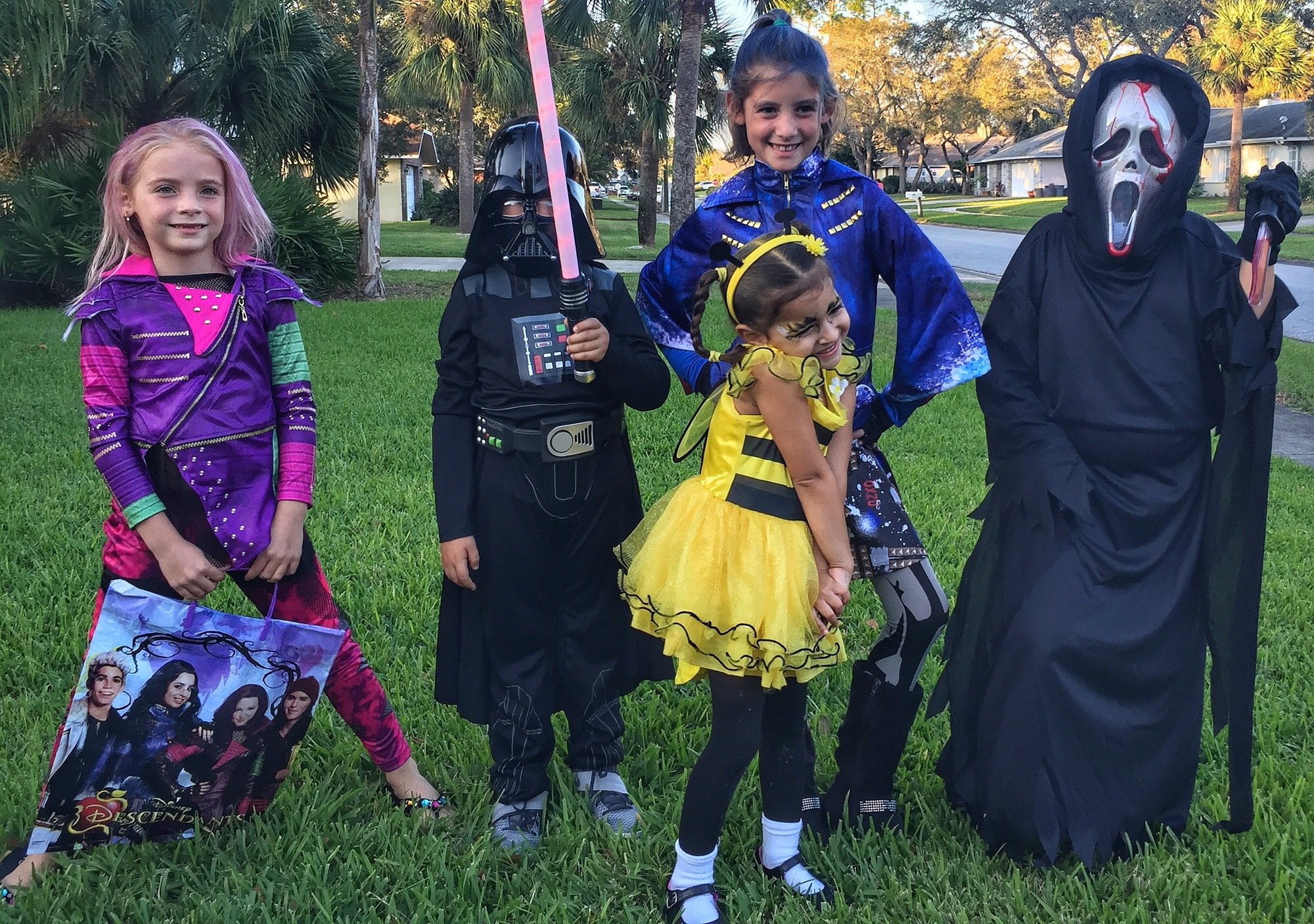
Each year, as the clock strikes October, we suddenly break out the sweaters, light up our pumpkin candles, and turn our thoughts to really important matters such as what are we going to be for Halloween? If you've got young kids at home, chances are they've been brainstorming their costumes for weeks now (and will probably change their mind approximately 3 million times before October 31). But what about when your kiddo suggests a costume that's … how shall I put this? … culturally insensitive? Such is the predicament one anonymous mom faces, and she recently wrote to Slate for how to direct her daughter's Halloween aspirations away from her unintentionally offensive costume idea.
In a letter penned to Slate's "Dear Prudie" column, the mom explains that the costume her daughter is gunning for was inspired by her current idol.
Her almost 8-year-old daughter, Sarah, spent much of the past summer with her "cool" aunt, the letter writer's "free-spirited big sister." And during that time, they formed a joint love of watching the beloved competition show Great British Bakeoff.
"Truthfully, it’s a very wholesome show," the mom continued, "and now Sarah wants to bake and I get to spend weekend afternoons in the kitchen with her while she does funny British accents, so I’m thrilled to bits."
Her favorite contestant? A Muslim Bangladeshi British woman named Nadiya, who has so inspired little Sarah that she already has copies of her cookbooks and has read about her on the Internet — a lot.
The girl has taken such a liking to the cook, she's even started pretending to be her during dress-up.
"Last weekend, when we were getting ready to make some cookies, she said she wanted to 'play Nadiya' and went to grab a towel to cover her head like this woman does," the mom wrote.
Oof.
"I told her that wasn’t OK, that this woman wore a scarf because of her religion and it wasn’t nice to do that when we don’t follow it," the letter continued, "but that she could pretend by doing her fake British accent."
But that didn't exactly nip the whole thing in the bud.
"Sarah says she plays Nadiya at her aunt’s, and now I’m annoyed," the mom explained. "Sarah was further distraught because she was planning to dress as this woman for Halloween."
In the end, the mom began questioning whether she was in the wrong, and turned to Prudie for advice: "My daughter can’t pretend to be this woman by donning a fake hijab in my house, her aunt’s, or for Halloween, can she?" she asked.
Before Prudie (aka Slate writer Daniel Mallory Ortberg) could weigh in, commenters were quick to agree that this was a touchy one.
"I wouldn't advise it," wrote one. "What if a kid wanted a 'costume' like a Hassidic Jew? Black coat, broad-brim hat, beard and sidelocks? Wouldn't that be a demeaning caricature?"
Touché.
"No, honey, we dress as fictional characters for Halloween, not real people," added another person.
Hmm … I can see the thought process here, but considering there are fictional characters who also wear hijabs — and, by extension, come from a variety of ethnicities — wouldn't that also be problematic?
Another person jumped in to refute this suggestion, writing: "I think it's better to dress as real people rather than 'races' or 'ethnicities.' My (Asian American) kid dressed up as Napoleon one year, and my other one (also Asian American) dressed as King Kamehameha another year."
Another commenter could understand her daughter's delight over the beloved cook, but ultimately agreed that dressing up as her was a hard no.
"I, too, adore Nadiya," the commenter wrote. "She popped up in a family baking competition show too, and I squealed in delight like a 2-year-old. [But] good lord, no on the hijab! Religion and ethnicities are not costumes. Good call, LW."
Others actually didn't see the big deal, and argued that letting the girl dress up as someone she loves is encouraging her to embrace other cultures.
"It is absolutely OK for your daughter to wear a headscarf," wrote one commenter. "It is a perfectly nice thing to do. There are Muslim women who don't wear hijab and there are also a small number of non-Muslims who do. It is not disrespectful or in anyway inappropriate."
Still, they wondered aloud, "If you don't like the sight of her dressing up this way in your own home, that is something for you to really ponder."
To be fair, it doesn't seem as though the letter writer has any issues with "the sight" of her daughter in a hijab — merely that she worries about whether or not it's culturally insensitive. Especially if her daughter wants to go door-to-door on Halloween.
As for Prudie? The response was a bit more measured (as you'd expect).
"There are two things worth stressing to Sarah at the same time," Prudie advised. "First, she’s not in trouble for liking Nadiya or wanting to be like her; her admiration is genuine and not driven by any impulse to mock.
"Second, you can also start talking to her, in age-appropriate ways, about the history of Islamophobia and black- and brownface (there’s even a current political story you can bring in to illustrate your point) and why putting on a funny British accent generally isn’t considered rude when imitating other peoples’ accents often is."
Prudie pointed out that at the end of the day, Sarah seems like an "inquisitive, playful, and warmhearted" girl who would probably benefit from her mom leveling with her instead of talking down to her.
"Rather than saying, 'No, you’re forbidden to do X,' once you’ve talked more about the context and history of such costumes, encourage her to develop a thoughtful, conscientious response that’s neither self-flagellating (since it’s not her fault as an 8-year-old) nor dismissive (since she has to live in the world and can’t shrug off history)."
In the end, Prudie agreed with the letter writer, and backed up her opinions on the whole thing.
"I think you’re right to draw the line at letting your daughter put on a hijab for a Halloween costume, and if it becomes necessary you can say: 'Sorry, I’m your mom and I said so,'" Prudie explained. "'You can communicate the persona of Nadiya the baker through some other means.'”
Whether an 8-year-old will be able to logically absorb that — and not protest in loud, angry wails — is yet to be determined. But it's clear that this topic is ever evolving, even for adults. If this letter had been penned 10 years ago, the internet (and maybe even Prudie) might have reacted differently. But as our cultural awareness has shifted, our eyes have been opened to what is and is not appropriate when it comes to channeling people of different cultures — real or fictional — on Halloween. It's a conversation we need to keep having.




